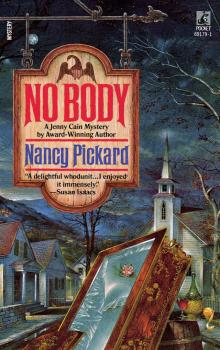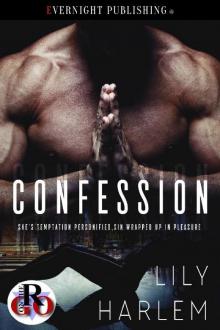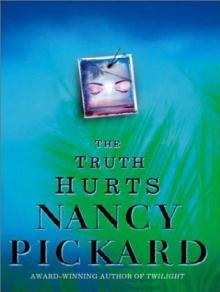- Home
- Nancy Pickard
The Whole Truth Page 4
The Whole Truth Read online
Page 4
For free.
Or, almost free. The McCullens paid for the utilities, and by doing completely without air-conditioning and using the ceiling fans, they cut those bills back to practically nothing. Their boss picked up every other expense: lawn service, pool service, even house cleaning once a month. He didn’t even mind that they had three young children and a couple of cats.
“What if we break something?” Tony asked him.
“Accidents happen,” his boss agreed. “But I know you and Susan, and I can’t think of any people I’d trust more. Something breaks, that’s what insurance is for. Don’t worry about it.”
“Don’t you want to sell it?”
“Hell, no, we designed the damn thing to retire in, and that’s not so far away. I like that house. My wife loves it. We’ll live in it someday, but it seems a shame to waste it, when a family like yours could be using it.”
And so the McCullens moved in.
At the time, Tony and Susan were both twenty-seven years old. Natty Mae was four, and the boys, Todd and Troy, were eighteen months. Susan cried for joy when she heard about the boss’s offer, she cried the first time she walked into the house, and she cried the day they moved in. It meant a lot more than a free place to live. Now they wouldn’t have to pay rent on their apartment, or day care for their kids. She could stay home without feeling guilty because she wasn’t bringing home any money. A lot of pressure lifted from Tony’s broad shoulders, too.
But Susan is a natural-born worrier, and their new and astonishing living arrangement didn’t ease her mind entirely.
“This is way above our heads,” she fretted to Tony. “How are we ever going to afford the electricity on a place like this? Our kids don’t know how to swim yet. What if one of them falls in the pool, or into the canal out back?”
He said they could live without air conditioning, if they had to, and he’d teach the kids to swim, and all about water safety.
That helped, but it wasn’t all that worried Susan.
“We knew someday we’d have to move out,” she says, “and how would our kids feel then, having to go back to where we really belonged? It’s hard to step down, after you’ve been living in the lap of luxury. My grandma used to say, ‘How are you gonna keep ’em down on the farm, after they’ve seen Paree?’”
Her fears about money seemed groundless, at least for their first comfortable, fun year in the house. They were the envy of everybody they knew. They gave tours to their friends and family, and pool parties where everybody brought their own booze and nobody was allowed to get out of hand, for fear of breaking things, or offending the neighbors. They began saving for their own house, the much more modest one they hoped to be able to afford one day.
They were happy, their boss was happy, even if the other employees were jealous, and said so.
But as the McCullen family’s savings grew, so did their desire for a boat, just a little one, to ply the canals that tempted them from the backyard. The house had a lovely wooden dock, and what was a dock without a boat?
And so, at the beginning of their second year of living there, they purchased a used runabout for $8,000, on credit, with a down payment, and named her the Lucky Ducky.
“I had no idea boats were so expensive to keep up,” Susan says. They were midwesterners who’d lived in Bahia only for a few years, and they’d been too busy having babies and trying to support them to pay much attention to the multi-million-dollar business of boating in south Florida. “Man! We might as well have decoupaged that boat in hundred-dollar bills!”
Tony says it wasn’t that bad, that Susan exaggerates about it, but there was a complete engine overhaul they didn’t expect, and a zillion less costly repairs and items to buy.
“Do you know you even have to buy a special key chain for a boat?” Susan told her mother back in Dayton, Ohio. “You’ve got to have one that floats, in case your key falls in the water.”
Somehow, expenses mounted, too, just from living in such an affluent neighborhood where it was nothing for moms to take a van-load of kids to McDonald’s several times a week, sometimes more than once a day. And where Susan felt Natalie couldn’t go to the nearby elementary school dressed a whole lot poorer than the other girls.
It was expensive, and they weren’t even trying to keep up with the Joneses! They just didn’t want their children to feel different or deprived, in comparison with their playmates.
“I didn’t want them to feel ashamed,” Susan says.
By the night Natalie died, Susan was regularly having trouble sleeping, worrying about making ends meet. “And I wasn’t the only one on that block doing that,” she claims. “One thing I found out from living there, was that rich people worry about how they’re going to pay their bills, too.” She was learning that people everywhere have a tendency to live beyond their means, no matter the size of those means.
The gift house was turning out to be a burden, in ways they never expected it to be. She hated to feel ungrateful, but she began to wish that Tony’s boss had never offered it to them, and that they were still living in their tiny apartment on a landlocked block in a blue-collar part of town.
And then the worst happened, and the house of their dreams turned into the scene of a parent’s worst nightmare.
Tony McCullen has a sensible way of speaking that goes with his appearance. A former amateur boxer, he’s six foot tall, solid and muscular, with an unusually long reach from shoulder to knuckles. When he was in the ring, his nickname was The Gorilla, because of that reach, and because he’s hairy—lots of curly black hair, including on his arms, legs, chest, and back.
“He was good,” Susan says loyally, of his days in the boxing ring, “but I told him that if he got his nose broken, I wouldn’t marry him.” She’s only half-joking. The truth is that Susan did hate his fighting, and she insisted he quit, because she was scared to death he’d suffer brain damage.
“I loved her enough to do it,” he says. Susan, a former beauty pageant contestant, was the prettiest and most sincere girl he’d ever known, and he didn’t want to lose her.
“I thought he was really cute,” Susan says. “And I didn’t want to be married to a punch-drunk guy with a bent nose and cauliflower ears.” It made her mad to hear people call him Gorilla. When he stopped fighting, she put her foot down one more time: no more nickname. His name was Anthony, a beautiful name. He was to be known henceforth by that name, or by Tony. No more Gorilla, at least not within hearing range of his new wife.
It tickled Tony, her concern for everything about him.
“I wasn’t that talented, anyway,” he confides. “She gave me an excuse to get out.”
He’s a straightforward kind of man, blunt, good with words, intense and focused, which are probably traits that helped to make him a rising salesman for the Motor Land Company. When he was interviewed by the Bahia Beach detectives, he looked them right in the eye, “even when he was crying,” observed Detective Anschutz in her notes on their initial interview.
The ancient Chinese believed there are secret forces at work in the world drawing together those people who belong together. Those “secret forces” were believed to be entirely beneficent. It was only when human beings willfully, obstinately, abused their freedom that the gods abandoned them to fate.
Eventually, it would be possible to trace the sequence of “willful, obstinate” human error that drew Ray Raintree toward the McCullen boat dock that night, at that time, out of all the nights, times, and boat docks in south Florida. It was also possible to track the “human error” that left a door invitingly open for a little girl to be drawn down to rendezvous with her killer that night.
“I almost always watch a little Leno in the family room before I go to bed,” Tony miserably explained to the detectives. The late-night talk show starring Jay Leno, he meant. “It just relaxes me, I guess.” In south Florida, The Tonight Show doesn’t come on until 11:30 P.M.
“So about how long do you usually watch it?” Det
ective Robyn Anschutz asked him.
“I don’t know. Through the opening monologue, not much after that unless he’s got a really good guest I want to see. Dennis Rodman. Tanya Harding. Controversial people, especially sports stars, like that.”
But Jay Leno’s first guest that night had been a hog-calling state fair winner, which hadn’t been compelling enough to keep Tony up any later. He turned off the television and the lights in the family room, and went off to bed.
“Did you check on the kids, Tony?”
He didn’t that night, because he didn’t always. All three of them were light sleepers, and it was a mistake to make any sudden noise that might waken them. Though Natalie was deaf, she was ultrasensitive to movement in the house. Wake any of the kids, both parents said, and you could count on a long night of trying to get them back to sleep again.
So he tiptoed past their bedroom doors, then on down the hallway to the room he shared with his wife. Telling the detectives all this, Tony broke down into tears and said that he wished he had taken a last look at Natalie. One final glimpse of her sweet, sleeping face. He wished he had, maybe she would have awakened, and then the worst thing that could have happened would have been a little delayed rest for him.
But he didn’t open her door.
He didn’t peek in one last time.
Among all the blessings that Susan and Tony counted before they moved their family into the free house, the three most important ones were their children. There were the twins, the Holy Terrors as Tony called them: Troy and Todd, a couple of identically adorable blond babies who shared a crib and every minute of their lives from the moment they were conceived. They were always inseparable, always on the move (“Even inside my tummy!” Susan recalls with an eye-rolling grimace), and always loud. “They do everything at top volume,” their mother maintains. It’s an irony, of sorts, since their older sister was never able to hear a single cry they made when they were babies, or a single word they uttered as they got older. By the time they were born, when she was two years old, she was already stone deaf.
Natalie was not born that way.
“It was an unusual series of inner ear infections that did it,” her osteopathic pediatrician, Dr. Norma Battle, explains. “I’ve never seen one child get so many serious ones, in such rapid succession. They started before she was three months old, and it seemed as if we never got one cleared up before the next one struck. We could never get her sufficiently free of infection for surgery. By the time she was eighteen months old, she was almost completely deaf.” The doctor, fifty-seven and a grandmother four times over, looks upset just remembering it. “I can’t help but think that in another century, she would have died from the infections, long before the age at which she was killed.”
The pediatrician admits, “I have seldom felt so helpless in the face of chronic infection.”
She gives a weary smile when talking about those days.
“On the other hand, when Natalie went deaf, the infections stopped as if by magic. Almost for the first time in her life, she was free of pain. Deaf, but out of pain. In that sense, the deafness came as a relief, if you see what I mean. I think even her parents would agree that dealing with a deaf—but otherwise happy—child was easier than dealing with a child who was either screaming with pain, or stuffed with medicine.”
The doctor sighs in telling it.
“After that, Natalie was about the healthiest little girl you’d ever meet. She went from sick, crying, miserable, to laughing and joyous—and deaf—practically overnight.”
Why was the child so susceptible to ear infections?
The pediatrician shakes her head. “Why is the remaining big question in medicine, isn’t it? The underlying philosophical conundrum. Why, really, does anybody get any disease? And why don’t other people, all other things being equal, get it? We pretend to answer that, with camouflaging, hundred-dollar words like ‘immunological deficiency.’ But there’s always another ‘why’ underneath the last answer, and another one and another one under that.
“I don’t know why.” Dr. Battle, seated in her office, turns to stare out at a sunny day. She looks stricken. “I don’t know why that one little girl appears to have been cursed by fate.”
Natalie’s parents do agree that dealing with a deaf child was easier—in the relative way these things have of being compared—than dealing with a screaming one.
“There were courses we could take to help us,” Susan says. “There were books we could read, there was even a language we could learn to communicate with her. It sounds hard and sad, I know, but you’ve got to remember that we finally had a well child. She smiled, she was happy. She could play, instead of lying on the couch, all medicated. She just blossomed overnight, and I think it was because she was so glad to be out of pain.”
Susan goes on to say, “The deafness was just something we learned to live with, and it was okay, because we finally had a laughing little girl, the boys had a sister they could play with. Does that sound strange to say, that it was okay with me that my child was deaf?”
She pauses, and then expresses a thought very similar to the doctor’s. “Why did one little girl have to have so much suffering? She came on this earth and she suffered for almost two solid years and then she had just four years of a normal life, and then she died in a horrible way. What’s the purpose in that kind of existence, I want to know, I really do want to know.”
And why did everyone who loved her have to suffer, too?
Those were the agonizing “whys” that no police detective would ever be able to solve. They did think, however, that they correctly pieced together a probable scenario for Natalie’s own actions on the night she was killed.
* * *
It is believed that she woke up for some reason.
A dream. A vibration in the walls of the house. A growing pain. We’ll never know for sure. Natalie, herself, may not have known exactly what woke her up.
Her room was dark, but Natalie was never scared of the dark. She was too young to gauge the hour of the night, and smart as she was, she still couldn’t tell time. For all Natty knew, morning and breakfast might have been only moments away.
At some point, she decided to get up. She must have turned on the overhead light in her room, because Susan found it on when she went racing down the hall to check on her daughter after the police came the next morning.
Natalie then dressed herself.
She put on clean underpants from her underwear drawer, leaving it open as her mom always asked her not to do. She put on the same pink shorts she’d worn on Sunday. She chose a clean T-shirt from a stack of neatly folded ones in a clothes hamper. The tee was one of her favorites, even though it was a hand-me-down from her cousin Ginny. It was a souvenir from the movie The Little Mermaid. Natalie had a video of the film. She and her playmates loved it. They watched it almost as often as they watched the newer Disney movies. Natty had first seen the movie while she still could hear, so she knew a few words and the music by heart.
Natalie fastened a pink barrette in her hair. She never went anywhere without wearing a barrette. And she grabbed her favorite bracelet—a row of tiny, linked, plastic hearts—although she couldn’t fasten it around her wrist without somebody to help her do it.
Evidently, she did not put on shoes. None were missing later. Not her summer thongs for the beach, nor her pink plastic cutout sandals for the swimming pool, nor her tennies or her white leather dress-up shoes. Natalie wasn’t supposed to go barefoot outside, but this time it appears that she did.
“I took it for granted,” Susan says, “that Tony locked the back door. He always did. I never even thought about it.”
Tony, who was sleeping, didn’t think about it either.
She was very quiet as she slipped out of the house. If she had banged the door or the screen door shut, the boys might have awakened, and probably their parents, too. A noise in the night—unexpected, startling—is enough to make almost anybody bolt straight u
p in bed, exclaiming, “What was that?”
But she was very quiet, like a little mouse.
Susan found the inside door open in the morning. By that time the boys were up and playing outside, so she assumed they did it.
Natalie loved the feel of grass under her bare feet.
She may have walked directly to their dock, or she may have wandered a bit first. She probably wasn’t in the least afraid. Not of the dark. Not of her own yard, or her own safe neighborhood where everybody kindly watched out for the little deaf girl when they backed out of their driveways. Unlike hearing people, she wouldn’t have been spooked by strange noises in the night.
At some point, she ended up down at the dock.
Natalie wasn’t afraid of the water, and she adored boats. “When there wasn’t an adult around to watch her, it was a fight to keep her off of our boat,” her mother told the investigators. “When we visited other people’s docks, I kept my eye on her every minute, or else she’d be scrambling around in their boat.”
She wasn’t afraid of strangers, either.
“She never met a stranger,” her father says. “We tried to tell her, not everybody was her friend, but it seemed like everybody really was her friend, because they were nice to her. Wherever we went, she smiled at people and they smiled back at her. She couldn’t hear what they were saying, so they could be total jerks and she wouldn’t even know it.”
It is surmised that when Natalie reached the dock that night, she was attracted there by a cute little black and white boat slowly puttering down the canal.
The second of three calls connected to the murder of Natalie McCullen came into Bahia Beach 911 at 11:55 P.M. on Monday, June fifteenth, the night before her body was found hanging from the bridge. The call was from a woman who lived catty-corner across the canal from the McCullens and who reported a boat moving along the ater. She thought it seemed suspiciously slow, suspiciously quiet. In south Florida, burglars have access from land and water, so residents keep an eye on both.

 The Scent of Rain and Lightning
The Scent of Rain and Lightning No Body
No Body The Secret Ingredient Murders: A Eugenia Potter Mystery
The Secret Ingredient Murders: A Eugenia Potter Mystery The 27-Ingredient Chili Con Carne Murders: A Eugenia Potter Mystery
The 27-Ingredient Chili Con Carne Murders: A Eugenia Potter Mystery Twilight
Twilight Marriage Is Murder
Marriage Is Murder I.O.U
I.O.U The Virgin of Small Plains
The Virgin of Small Plains Generous Death
Generous Death The Whole Truth
The Whole Truth The Blue Corn Murders
The Blue Corn Murders Say No to Murder
Say No to Murder Confession
Confession Dead Crazy
Dead Crazy The Truth Hurts
The Truth Hurts Bum Steer
Bum Steer